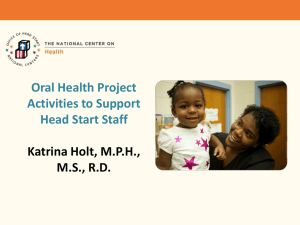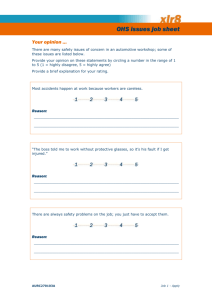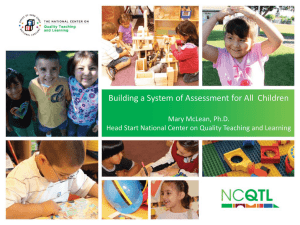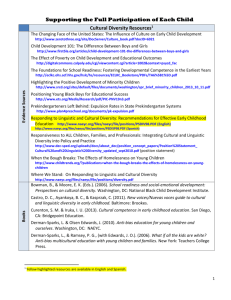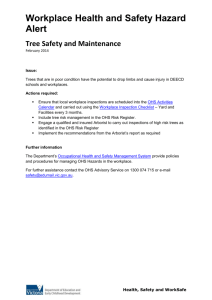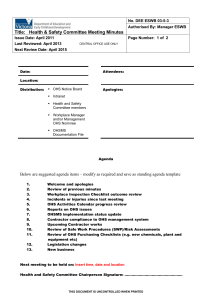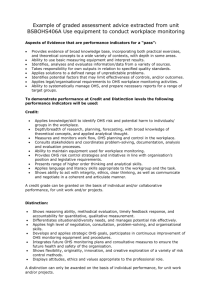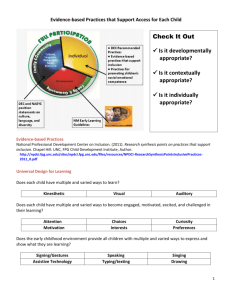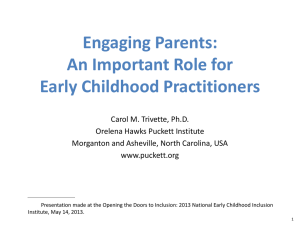Head Start
advertisement
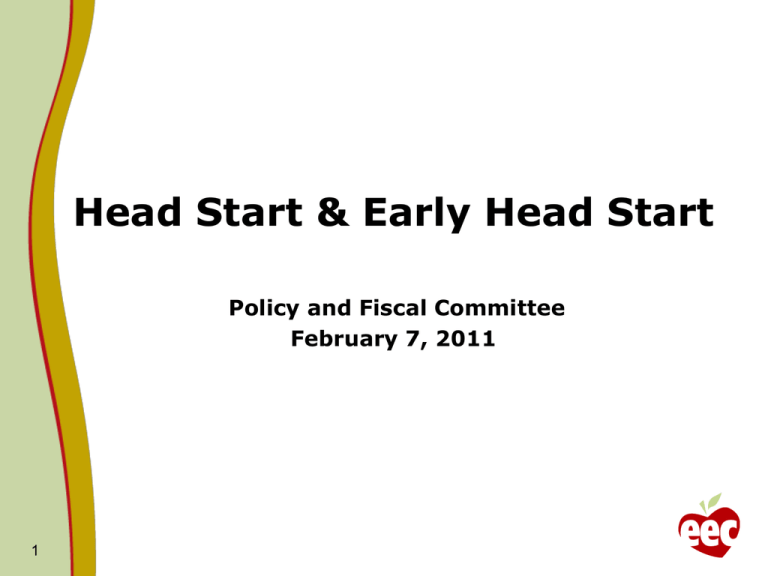
Head Start & Early Head Start Policy and Fiscal Committee February 7, 2011 1 Head Start Presentation 1.Head Start-Overview 2.Head Start in Massachusetts Data 3. Office of Head Start Road Map to Excellence –New vision & Priorities • • • • Revised Performance Standards National Resources Centers Monitoring Strengthening Collaboration 4.FY12 Head Start State Supplemental Grant 5.Resources 6.Questions 2 Head Start 1. What is Head Start? Head Start (HS) is an early education and comprehensive child development program that serves low-income children from birth to age 5 and their families, as well as families pre-birth, Early Head Start (EHS). It is administered by the Office of Head Start (OHS), Administration for Children and Families (ACF), U.S. Department of Health and Human Services. What is Head Start’s Goal? To increase the school readiness of young children from low-income families and prepare them for later learning. It is also a two-generational program that promotes family engagement, and provides family support and social services to prenatal families and families of all enrolled children. 3 2. Head Start in MASSACHUSETTS FY10 Head Start provided services to: 16,166 children*, 181 pregnant women, & 14,927 families in over 385 communities. Geographic Representation of HS Western 7% Boston 7% Greater Springfield 7% Cape and Islands 7% Greater Boston 22% Greater Worcester 15% Southeast 21% Northeast 17% Transportation Services provided to 5,338 students 4 Head Start Program Information Report (PIR) 07/01/09-09/10/2010 –*Cumulative numbers Enrollment years Head Start Grantees in Massachusetts Program Type Grantees Participants Head Start Preschool grantees Ages (3-kindergarden entry) 29 14,338 Early Head Start grantees Ages (0-2) 18 1,647 Migrant and Seasonal Program (HSMS) Ages (0-2) 1 99 Total Funded: 48 grantees 16,084 (PIR’s count) Federal Funded Agency Types Represented: 5 Community Action Agency (CAA) :28 grantees School System (public/private): 2 grantees Private/Public Non-Profit (non CAA): 17 grantees PIR FY 2009-2010 Data. Program Information Report (PIR) * MSHS=Migrant and Seasonal HS (Worcester & Westfield) Head Start Number of Children Enrolled in EHS/HS Programs (by Age) 6,828 Total:16,048* 5,697 1,146 371 EARLY HEAD START 6 1,261 682 2009/2010 Head Start Program Information Report *=Federal Funded numbers PIR data HEAD START Head Start in Massachusetts Options for Service Delivery Program Options # Children funded % of Children Center-based Full Day (5 days per week) 4,967 37% Center-based Part Day (5 days per week) 6,642 49.58% 138 1.03% 660 4.93% 34 .25% 113 0.84% 87 0.65% Home-based Program 619 4.62% Family Child Care Option 202 1.51% Of these, the number in double sessions Center-based Part Day (4 days per week) Of these, the number in double sessions Combination Option Program Locally Designed Option (meet needs of local community i.e. shelters) Services Eight Hours or More There are 4,870 children receiving 8 hours or more per day. PIR FY 2009 data & ACF/OHS data 2009 Head Start in MA- Eligibility Head Start Eligibility Age eligibility Head Start (3- kindergarten entry) Early Head Start (0-3) Also serves pregnant women Income Eligibility: Family income less than or equal to 100% of the federal poverty level Income between 100% & 130% (no more than 35%) Over- income (a limited number of families) Categorical Eligibility: Receipt of Public Assistance Foster children Homeless children Children with Disabilities (10% of enrollment) Other: Family must live in their local program’s service area (unless family is homeless then this requirement does not apply) 8 Head Start Eligibility Requirements – Performance Standards ERSEA Head Start – Comprehensive Services Examples of HS & EHS Services Provided 9 Screening - Cognitive, developmental, behavioral, sensory (vision & hearing); determining children’s oral health status; referring children for services if needed; Individualized learning & formative assessment; preschool programs use the FY 2010 Revised Head Start Child Development & Early Learning Framework, this reflect key elements of school readiness* Monitoring children’s health status including their nutritional status; requiring dental examinations; linking children to medical and dental homes; Soliciting parental information, observations, and concerns about their child's mental health and responding to the identified behavioral and mental health concerns of an individual child or group of children; Promoting family engagement, family literacy, Father Initiatives, and other activities to support parents as their child’s first educator; Providing family support services to help families achieve and maintain self-sufficiency; Others – See chart next slide Head Start Family Services Provided Marriage Education 259 Assistance to Families of Incarcerated Individuals 305 Child Support Assistance 14,382 Families received at least one service 941 Substance Abuse Prevention or Treatment 728 Domestic Violence Services 898 Child Abuse and Neglect Services 1,527 Job Training 1,808 English as a Second Language (ESL) Training 3,112 Adult Education 1,869 Mental Health Services 3,112 Housing Assistance 3,999 Emergency/Crisis Intervention 5,708 Health Education 11,869 Parenting Education 10,638 0 2,000 In FY09/10 Head Start served 1,213 Homeless Families 10 2009/2010 Head Start Program Information Report cumulative 4,000 6,000 8,000 10,000 12,000 Number of Families 14,000 Head Start in Massachusetts FY11-Federal Funds Funding Source – (OHS Federal Funds) does not included ARRA Allocation FY 2011 (includes COLA & HS Base-Federal funds (ACF/OHS) $104,703,999 EHS Base-Federal funds (ACF/OHS) $10,605,770 Head Start Collaboration Office (HSSCO) $175,000 Total Federal Funding HS & EHS $115,120,935 FY10-Federal ARRA Funding training) (Funded in FY10 to serve 09/30/10-9/29/11) Funding Source (OHS Federal Funds) Allocation FY10 HS/ ARRA Expansion Federal funds total (13 programs) $1,305,045 (151 children) EHS Expansion Federal funds total (10 programs) $7,950,739 (590 children) Total ARRA Federal funding $9,255,784 ACF/OHS –FY2011 Data 11 The annual COLA is based on Consumer Price Index (CPI). From FY2002-2008 programs experienced a real cut of 13% when adjusted for inflation and for the first time since 1955 the CPI is currently projected to decrease. Head Start Funds MA State Funds Funding Source Allocation FY11 Description HS State Supplemental $7.5 Million 1.Provides state supplemental salary grants to support staff. 2.Funds are also used to meet matching requirements federal funds. 3. 254 slots -support expansion of enrollment services ** Financial Subsidies * –Voucher & contracts $ 7,110,534 Total $14,610,534 2,397 slots are supported through voucher and contracted slots (Before and after care) Total State Children:2,649 FY 2010 EEC-ARRA Head Start Wrap Around Initiative A total placement for this initiative is 251 (Total unique children served are 144: 83 through vouchers and 61 through contracts) *EEC Financial Subsidies data for July 90 to June 2010. Includes voucher and contracts (before and after care) 12 **=the cost of 254 expansion of enrollment services to state-funded children are not included in the Supplemental Budget Cost. However, programs are required to commit to serve the number of state funded slots assigned in the original grant, 2006. 3. Office of Head Start: New Priorities and Vision The Head Start Roadmap to Excellence: Improving School Readiness & Promoting Long-Term Success a. Revised Head Start Program Performance Standards: Incorporate the latest evidence on teacher-child interactions and predictors of school success Emphasize foundational literacy, math, and science skills, and promote children’s healthy social emotional and physical development. Incorporate new research showing that family engagement in children’s learning is crucial to achieving positive educational outcomes for children. Incorporate best practices on family engagement including an increased emphasis on family literacy Implement the Classroom Assessment Scoring System (CLASS) to evaluate the quality of teaching and learning activities in the classroom Further strengthen Early Head Start Quality Standards 13 Data from OHS Road Map to Excellence Head Start- New Priorities and Vision The Head Start Roadmap to Excellence: helping programs meet new expectations through Professional Development Initiatives and a stronger Training and Technical Assistance System b. National Resource Centers: Disseminate current research and best practice through National Centers of Early Childhood Excellence Early Head Start National Resource Center Center on Quality Teaching and Learning Center on Cultural and Linguistic Responsiveness Center on Program Management, Design, and Fiscal Operations Center on Health, Nutrition, Dental, and Mental Health Center on Parent, Family, and Community Engagement- MA * Other Resources: Head Start Training and Technical Assistance System The goal of the T/TA system is to create easy accessible team of professional development providers at the state and local level, who can work with HS programs to improve the quality of teaching and other services. (In MA- T/TA system awarded to UMASS Donahue Institute) 14 *The Center on Parent, Family, and Community Engagement: has been awarded to Brazelton TouchpointsCenter (BTC) at Children’s Hospital of Boston and the Harvard Graduate School of Education and Research Project (HFRP) with their partners Save the Children, the National PTA, an the Council of Chief State School Officers. Head Start – New Priorities and Vision The Head Start Roadmap to Excellence: Enhances the monitoring process to improve how quality is measured including new assessments of teacher-child interactions. C. Office of Head Start Monitoring Protocols The FY 2011 Monitoring Protocol is the tool that guides the on-site monitoring review. The Protocol identifies the key requirements (Performance Standards and Federal regulations) against which to monitor grantee performance. Grantee data gathered through the monitoring process provides OHS with information on performance, thereby informing determinations regarding program quality and compliance. The Protocol has been revised for FY 2011 to place a greater emphasis on the quality of the delivery and management of program services. The focus of the Protocol is on making connections between program systems and collecting data on critical indicators of success in promoting school readiness. Data from the FY11 Head Start Monitoring Protocol 15 Head Start – New Priorities and Vision Office of Head Start Monitoring Protocols The Protocol organizes elements of program performance standards, the Head Start Act, and other regulations into 11 sections against which compliance will be monitored: 1. Health Services 2. Nutrition Services 3. Safe Environments 4. Transportation Services 5. Disabilities Services 6. Mental Health Services 7. Family and Community Partnerships 8. Education and Early Childhood Development (ECD) 9. Fiscal Management 10. Program Design and Management 11. Eligibility, Recruitment, Selection, Enrollment, and Attendance (ERSEA) 16 Head Start The Head Start Roadmap to Excellence: assuring the integration of HS into a continuum of High Quality Care and Education that spans from Birth to Age Eight d. Strengthen Collaboration with Early Childhood Entities at the Local, State, and Federal Levels: 17 Promote interoperability between the Head Start data system(s) and those of state preschool and K–3 systems Promote continuity of services and effective transition of Head Start children into the public schools Collaborate with institutions of Higher Education to promote professional development through education and credentialing programs for early childhood providers in states Encourage the inclusion of Head Start Program Performance Standards in state Quality Rating and Improvement Systems and support the participation of Head Start programs in QRIS Bring together key early childhood decision-makers, including representatives of Head Start, to plan the development of state early childhood systems 4.FY12 HS State Supplemental Renewal Grant 18 Purpose and New Requirement: Enhance program’s capacity to continue to serve statefunded children by implementing program practices that provide the full array of Head Start services; Support professional development and competency of staff through maintaining compensation support; Supplement federal funds to support programs’ ability to continue to match no less than 20% of federal funds with nonfederal sources. These are the only EEC funds which can be used for matching federal funds; (NEW) Enhance program’s quality by requiring all Head Start and Early Head Start center-based and family child care program options to fully participate in the QRIS by 2014; (By requiring 33%participation in FY12 and building to 100%by FY14) FY12 HS State Supplemental Renewal Grant 19 Current Eligibility: (29 existing lead agencies) Only agencies that received Head Start Supplemental grant funding in FY2011 are eligible to apply for FY12 Program Types: Head Start(29),EHS (12), and Migrant & Seasonal HS (1) Agency Types: Community Action Agencies, Private/Public Nonprofit, School System Program Options: Center-based, Family Childcare, combination programs, and locally designed All current Head Start and Early Head Start programs seeking to renew their FY2011 grant must apply for renewal funding using the Head Start State Supplemental Renewal Grant application for FY12. Data from FY2012 Head Start State Supplemental Grant FY12 HS State Supplemental Renewal Grant 20 Funding: ($7.5 Millions) This is a one year Renewal Grant (7/1/2011 to 6/30/2012) subject to legislative appropriation, legislative authorization, an annual award of grant funds, and/or any other modification(s) made by EEC; 29 grants- FY12 total allocation FY12 -$7.5 M (including Head Start & Early Head Start lead agencies) In addition, programs that received State Head Start Expansion Grant funds in FY06 must continue to serve any children still enrolled with these funds in FY12; Programs must enroll the number of state-funded children in Head Start programs as identified in the Office of Head Start’s Data on state-funded enrollment by program. In FY12 , a total of 254 state funded children were reported by OHS Region 1. FY12 HS Supplemental-Allocation & Enrollment MA Head Start Grantees 21 Action for Boston Community Development Berkshire County Head Start Development Cape Cod Child Development Citizens for Citizens Communities United Community Action Community Action Agency of Somerville Community Action of Franklin, Hampshire and North Community Action Programs-Intercity Community Teamwork Dimock Community Services Corporation Greater Lawrence Community Action Council Health Education Services Holyoke-Chicopee-Springfield Head Start Lynn Economic Opportunity Martha’s Vineyard Community Services Montachusetts Opportunity Council Pathways for Children People Acting in Community Endeavors Quincy Community Action Programs Self-Help Somerville Mental Health Association South Middlesex Opportunity Council South Shore Community Action Council Tri-City Community Action Program Triumph Westfield School Committee Worcester Community Action Council Worcester Public Schools FY12 Allocation of Funds $1,629,570.00 $228,372.19 $254,411.25 $238,975.31 $204,579.38 $368,361.56 $270,018.75 $249,738.75 $140,299.69 $302,424.38 $54,572.81 $230,794.69 $146,963.44 $530,405.63 $284,787.19 $22,391.25 $237,938.44 $176,819.06 $85,117.50 $203,787.19 $448,248.75 $11,676.56 $244,252.50 $92,298.75 $141,880.31 $151,275.00 $91,180.31 $77,760.00 $381,099.38 Head Start State Funded Enrollment FY 2011/2012 48 9 0 0 10 6 15 10 17 15 0 10 0 54 16 0 0 0 0 9 0 0 9 0 12 6 8 0 0 Head Start – Resources/Links Head Start Program: http://eclkc.ohs.acf.hhs.gov/hslc/Head%20Start%20Program Centers of Excellence: http://eclkc.ohs.acf.hhs.gov/hslc/Head%20Start%20Program/roadmap/HHS_Announces_Centers_ Of_Excellence.pdf FY 2011 Head Start Monitoring Protocol: http://eclkc.ohs.acf.hhs.gov/hslc/Program%20Design%20and%20Management/Head%20Start%20Require ments/FY%202008%20OHS%20Monitoring%20Protocol Head Start National Resources Centers: http://eclkc.ohs.acf.hhs.gov/hslc/Head%20Start%20Program/roadmap/HHS_Announces_National_ Centers.pdf The Head Start Child Development and Early Learning Framework: Promoting Positive Outcomes in Early Childhood Programs serving 3-5 years old. http://eclkc.ohs.acf.hhs.gov/hslc/ecdh/eecd/Assessment/Child%20Outcomes/HS_Revised_Child_O utcomes_Framework.pdf Head Start State Collaboration Office http://eclkc.ohs.acf.hhs.gov/hslc/State%20collaboration Head Start Performance Standards 22 http://eclkc.ohs.acf.hhs.gov/hslc/Program%20Design%20and%20Management/Head%20Start%2 0Requirements/Head%20Start%20Requirements Questions? 23
